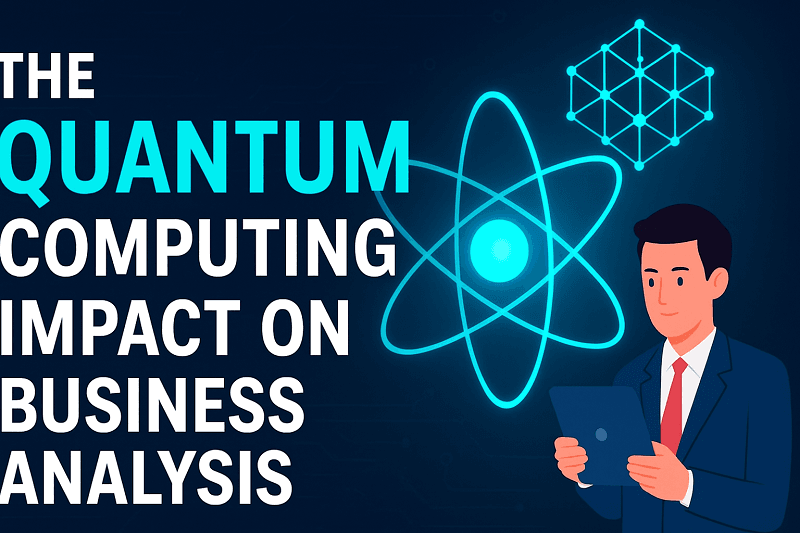
Introduction
Are you ready for the future of business analysis?
Quantum computing isn’t just for scientists anymore; it’s changing the way we look at data, find new chances, and tackle tough business problems.
If you don’t keep up, you might fall behind. Want to stay ahead?
Forget what you think you know about traditional business analysis.
By 2030, quantum computing won’t just affect business analysis—it will change it completely. In this article, we’ll look at the chances and important challenges ahead so you don’t miss out on the biggest change in analysis in our lifetime.
1.Quantum Leaps in Business Analysis: The Basics
What is Quantum Computing, in simple terms?
Quantum computing is a new type of computer that uses quantum bits, or qubits.
Unlike normal bits, which are either 0 or 1, qubits can be both at the same time, something called superposition. They can also affect each other, called entanglement.
Why is this important for business analysts?
Because quantum computers can check thousands of options at the same time, solving problems that normal computers take hours, days, or even years to handle.
Where traditional computers fall short
Business analysts today often deal with:
Big, messy data sets
Slow prediction models
Hard optimization problems (like supply chain, routing, and risk assessment)
Normal computers look at one scenario at a time, so when problems get bigger, it’s really hard to handle them.
The potential of quantum computing
Quantum computing could:
Process huge data sets in seconds
Simulate complex customer behaviors
Find patterns that current ML models can’t see
Optimize business operations instantly
In short: Quantum computing isn’t just about doing things faster—it’s about doing things that weren’t possible before.
2.Current Business Analysis: A Pre-Quantum World
Before we imagine the quantum future, let‘s be honest about the limits of today‘s business analysis environment.
The challenges business analysts face today
Too much data Companies collect a lot of data, but analysts can’t process or understand it all.
Optimization problems
Deciding where to put resources, managing inventory, or planning delivery routes becomes really hard.
Predictive model limitations
Traditional predictive analysis doesn’t work well when data is:
Very complex
Not straight forward
Changing quickly
Rapid changes in the world
Globalization, supply chain issues, and fast–changing customer trends push current tools to their limits.
Tools and methods that aren’t enough
Excel is too slow
BI tools can’t handle multiple dimensions of optimization
Machine learning hits walls with complicated, messy data
Real-Time Scenario (Limitation in today‘s BA)
A retail business analyst is trying to find the best delivery routes for 300 stores, considering factors like:
Traffic
Weather
Fuel cost
Vehicle capacity
Driver availability
A computer may take hours to find the best plan and it still won’t be perfect.
Quantum computing can solve this in seconds.
3.Quantum Computing’s Game-Changing Applications for BAs
Here‘s where the future gets interesting for business analysts.
1.Supply Chain Optimization at Quantum Speed
Quantum algorithms, like QAOA, can look at millions of route options at once.
Real-Time Example
A business analyst at Amazon could use quantum optimization to:
Reduce delivery times
Save fuel
Predict warehouse needs
Change plans quickly during disruptions
2.Financial Modeling & Risk Analysis
Banks and fintech companies are using quantum computing early on.
Quantum computing helps business analysts:
Run real–time stress tests
Simulate thousands of market situations at once
Detect fraud with quantum machine learning
Improve portfolio choices
Real-World Example
Goldman Sachs and IBM are testing quantum algorithms for financial risk models (source: IBM Research).
Business analysts in finance will soon need to understand the results of quantum–based simulations.
3.Quantum Machine Learning (QML)
Quantum ML helps get better customer insights.
It helps analysts:
Predict when customers will leave with more accuracy
Find small groups of customers
Offer personalized product suggestions
Find unusual activity in real–time
Example
A telecom analyst could use QML to find customer behavior patterns that normal ML models miss—especially small behaviors hidden in big, complicated data sets.
4.
Early Adopters Showing Tangible Value
Volkswagen is using quantum computing to improve traffic flow.
DHL is testing quantum optimization for logistics.
Google and NASA use real–time simulations for complex scheduling.
Quantum computing isn’t just a theory anymore—it’s being tested in real situations, and business analysts will be key in using these insights for business decisions.
4.The Quantum-Ready Business Analyst: Skills and Mindset
To do well in this new era, business analysts need to change.
1.Basic Understanding of Quantum Principles
Not coding.
Not physics.
But knowing things like:
Qubits
Superposition
Entanglement
Quantum algorithms
This helps a business analyst talk with technical teams and understand the results.
2.Ability to Interpret Quantum Insights
Quantum analytics gives probability–based results, not clear answers.
A business analyst must know how to:
Deal with probability distributions
Understand uncertain outcomes
Explain quantum results to other people
3.Ethical and Responsible Decision–MakingQuantum models can give deep insights into customer behavior.
Analysts must ensure:
Data is used transparently
Ethical standards are followed
Decisions are free from bias
4.Continuous Learning Mindset
Quantum technology is progressing very fast.
A business analyst should keep learning, updating their skills, and staying aware of new developments.
5.Navigating the Quantum Frontier: Opportunities and Challenges
Massive Career Opportunities
Business analysts who learn quantum concepts early can become:
Quantum Data Analysts
Quantum Product Analysts
Quantum Strategy Consultants
Innovation Analysts
Enterprise Transformation BAs
Companies will pay more for people who can connect quantum engineers with business leaders.
Challenges to Expect
1.Data Security Risks
Quantum computers might break some current encryption methods.
2.Algorithmic Bias
Quantum ML can uncover hidden, subtle biases.
3.High Initial Costs
Quantum computing is still expensive—adoption will happen slowly.
Conclusion:
Quantum computing is not a distant dream—it’s coming quickly.
Business analysts who prepare now will lead the next wave of digital transform
Related Articles:
How to Become a Business Analyst: https://www.bacareers.in/how-to-become-a-business-analyst/
Data Analysis for Business Analysts: https://www.bacareers.in/data-analysis-for-business-analysts/
Agile Methodology for Business Analysts: https://www.bacareers.in/agile-methodology-for-business-analysts/
Business Analyst Career Paths: https://www.bacareers.in/business-analyst-career-paths/
External Links
IBM Quantum Research: https://www.ibm.com/quantum
Google Quantum AI: https://quantumai.google
MIT Technology Review – Quantum Computing: https://www.technologyreview.com/quantum-computing
McKinsey Quantum Computing Insights: https://www.mckinsey.com/business-functions/mckinsey-digital/our-insights/quantum-computing

Business Analyst , Functional Consultant, Provide Training on Business Analysis and SDLC Methodologies.
🌐 Founder of BACareers.in| Freelance Business Analyst & Content Writer | Banking Domain Expert | Agile Practitioner | Career Mentor
I am the founder and content creator of BACareers.in, a specialized platform for aspiring and experienced Business Analysts. I share real-world insights, career tips, certification guidance, interview prep, tutorials, and case studies to help professionals grow in the BA career path.
We have strong experience in Banking, Financial Services, and IT. We bring deep domain knowledge and hands-on expertise in core banking systems, payment integrations, loan management, regulatory compliance (KYC/AML), and digital banking transformations.
💼 Business Analyst Expertise
Requirement Elicitation, BRD/FRD, SRS, User Stories, RTM
Agile & Waterfall (Scrum, Kanban) methodologies
Business Process Modeling (BPMN, UML, AS-IS/TO-BE)
Stakeholder Communication & Gap Analysis
UAT Planning, Execution & Support
Core Banking Solutions (Finacle, Newgen BPM, Profile CBS, WebCSR)
✍️ Content Writing & Strategy
Founder of BACareers.in – knowledge hub for BAs & IT professionals
SEO-optimized blogs, training content, case studies & tutorials
Content on Business Analysis, Agile, Banking, IT & Digital Transformation
Engaging, beginner-friendly writing for professionals & learners
🌍 What we Offer
Freelance Business Analysis services: BRD, FRD, UAT, process flows, consulting
Freelance Content Writing: SEO blogs, IT/business content, case studies, LinkedIn posts
A unique blend of analytical expertise + content strategy to turn business needs into solutions and ideas into words that work
📌 Whether you’re an organization seeking BA expertise or a platform needing impactful content, let’s connect and collaborate.
Business Analyst, Agile, BRD, FRD, Banking, Content Writer, SEO writing.

